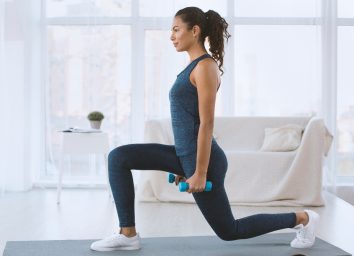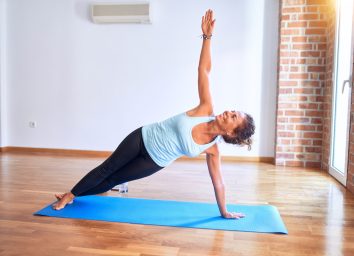5 Secret Exercise Tricks That Can Extend Your Life, Science Says
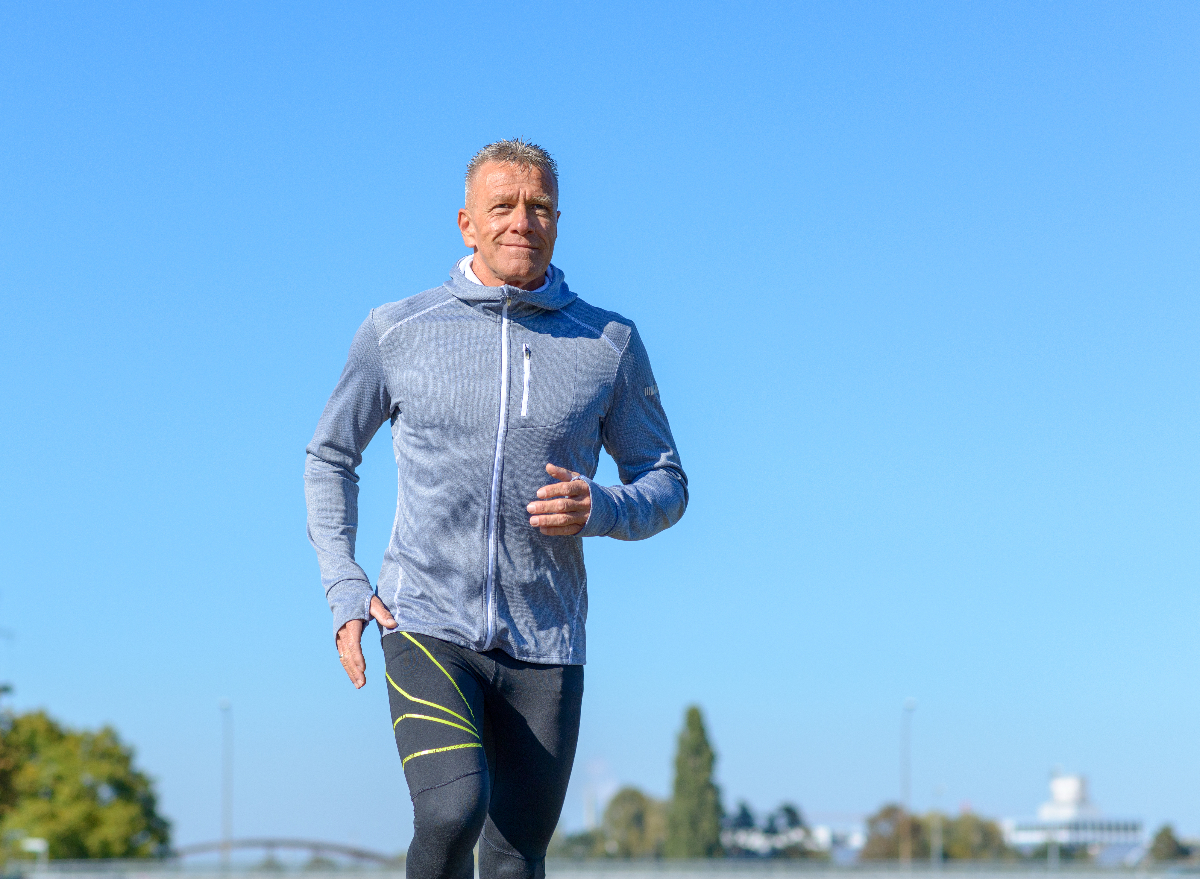
We all have but one life to live, and each adult should undoubtedly be in total control of theirs. So, if you choose to forgo exercise entirely and embrace a life of lounging, it’s absolutely your decision to make. That being said, it wouldn’t be the best choice for your health. The World Health Organization even considers sedentary living one of “the more serious yet insufficiently addressed public health problems of our time.” So, we’re here to share some of the best secret exercise tricks for longevity you’ll want to know about.
Don’t fall for the outdated and contrived viewpoint that daily exercise is only for bodybuilders and marathon runners. There are numerous reasons beyond just a better beach body to pursue a life characterized by movement over stagnation. A lifestyle that prioritizes (or at least makes time for) fitness is linked to a healthier heart, improved memory, and stronger bones.
Perhaps the absolute best benefit linked to exercising is a longer life in general. After all, what good is a sharp mind or rock hard abs if you aren’t around to enjoy the physical fruits of your labor? Indeed, a plethora of scientific research tells us movement is key to a long, healthy life. Take this study published in the British Journal of Sports Medicine, for example. Researchers conclude it takes a mere 11 minutes of daily movement to extend one’s lifespan! Similarly, recently released research published in JAMA Internal Medicine predicts that if everyone on the planet simply walked for an extra 10 minutes per day, over 111,000 annual deaths could be prevented.
If any older readers out there are feeling guilty about days spent on the couch years ago, keep in mind today is always a good time to get started—no matter your age. Astounding research published in the British Medical Journal: Heart indicates 20 minutes of exercise per day can help individuals as old as 70 avoid heart disease, which is considered the leading cause of death in the United States.
While it’s never too late to make a positive fitness change in your life, Dr. Tom Oddo, DC, CSCS, CEAS of City Integrative Rehabilitation suggests that individuals who are new to the world of fitness take things slow to start. “If you do not have a particular affinity for any physical activity, then my suggestion is walking or stationary biking, these are simple, low-impact activities that are easy to build habits around. My only caution here is to pick activities that make sense for your current body structure and activity level. Attempting to pick up a new, rigorous activity on day one (like running) is certain to create injuries and decrease your ability to continue healthy physical activity in the long term,” he tells Eat This, Not That!
So, we’ve established that exercise, in general, can keep you feeling better for longer and promotes a longer lifespan in general. If you’re interested in learning about a few additional exercise tricks and tips to extend your life, read on. And next, check out The 6 Best Exercises for Strong and Toned Arms in 2022, Trainer Says.
Find an active leisure activity
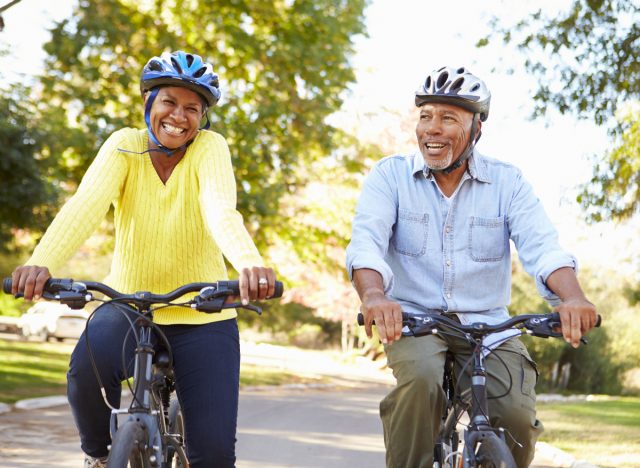
Contrary to popular opinion, there is no grand fitness edict stating that working out has to be a drag. There are plenty of ways to have fun while getting in your daily bout of exercise. Even better, science tells us that mixing in a little bit of leisure with our exercise adds an extra longevity boost.
One study published in the Scandinavian Journal of Medicine & Science in Sports finds that golfing is linked to a longer life. (The lower your handicap, the better!) Another research project released in the British Journal of Sports Medicine discovered that activities that aren’t specifically dubbed “exercise” (such as gardening) can prolong your lifespan.
The main message here is to find a form of physical activity you’ll actually enjoy. If you like jogging and lifting weights, great, but don’t be afraid to think outside of the box when it comes to fitness. That way, you’ll wake up each day and look forward to moving your body.
“The overarching theme when it comes to exercise and self-care is that the best type of exercise for you is the one that you will actually do. In other words, choosing activities you like will help you to remain disciplined. If you love to walk, walk! If you like to ride a bicycle, bike! If you enjoy playing basketball, jumping rope, or lifting weights quickly in a Crossfit gym, do it. The goal is to create a process that is fun,” Dr. Oddo explains.
Related: 9 Best-Proven Mind And Body Secrets To Live Longer, Says Science
Make exercising a social event
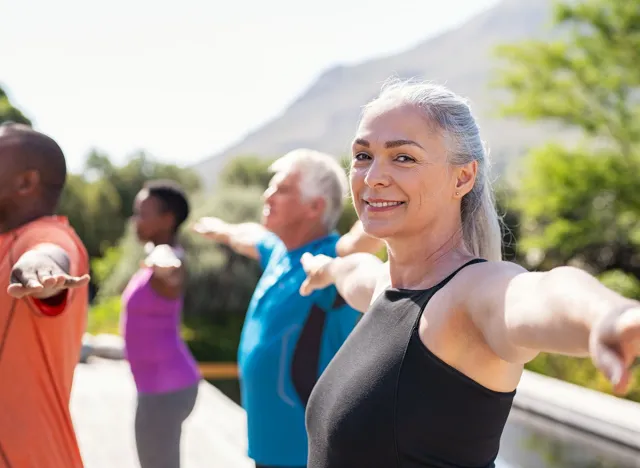
Human beings naturally crave social interaction, and it’s no different when it comes to fitness. From a longevity perspective, plenty of research strongly suggests that exercising socially is superior to hitting the gym solo.
This study published in Mayo Clinic Proceedings tracked over 8,000 people for over two decades. It was concluded that more social exercises like tennis and badminton can lead to “the best longevity.” Incredibly, tennis players tacked on an extra 9.7 years!
“Quality time with loved ones, whether it’s your partner, friends, or family, is key for a healthy and longer lifespan. Research shows this can decrease all-cause mortality and prevent chronic diseases as well,” Mitch Torres, PT, Lead Editor of Knee Force, explains to Eat This, Not That!
Moreover, if you exercise with a partner or steady group, you will be more likely to stick with the routine—even on days when the couch is calling. This project released in Health Psychology found that older adults were much more likely to commit to a fitness routine if they worked out with friends of a similar age.
“All of this together points to the power of social connections,” explains lead study author Mark Beauchamp, a kinesiology professor at the University of British Columbia, in a university release. “If you set the environment up so participants feel a sense of connection or belonging with these other people, then they’re more likely to stick with it.”
Related: The “Silly Little Walk” Trend Will Be Your New Favorite Outdoor Exercise
Find movement in your everyday tasks
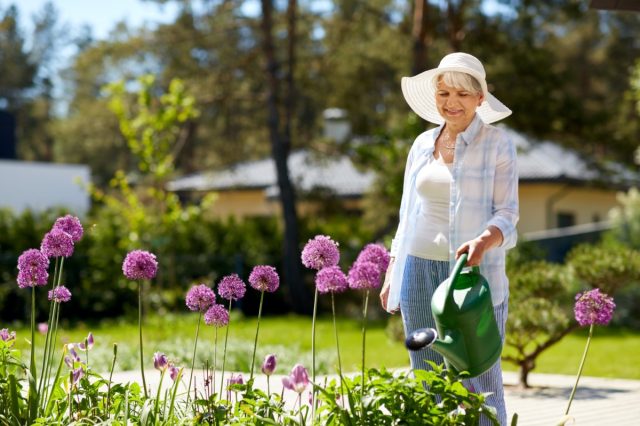
As alluded to earlier in this article, getting in your daily dose of exercise can be as simple as going out for a walk. In fact, research from Harvard University published in JAMA Internal Medicine recommends aiming for roughly 4,400 steps per day to significantly cut mortality risk. It’s also worth mentioning that study reports the benefits of walking tend to level off around 7,500 steps per day. So, you shouldn’t spend 12 hours per day walking!
Still, 4,000+ steps per day may sound daunting—especially while counting the seconds as they pass on your treadmill. Luckily, you don’t have to do all that walking at once. Another study published in the Scandinavian Journal of Medicine & Science in Sports backs up the importance of sprinkling in extra bouts of physical activity here and there throughout everyday life. Choose the stairs over an elevator. Park a bit further from the shop than normal. Help your neighbor carry their groceries. These little actions eventually add up.
TJ Mentus, CPT, of Garage Gym Reviews explains that over time, your body and mind will become accustomed to prioritizing physical activity above staying comfortable. “The other thing this will do is mentally train someone to intentionally find ways to get more movement in and take a more challenging route that will benefit them later. On the other hand, making more comfortable decisions over and over will train the mind and body to consistently do what is easier at the moment but has little to no long-term benefit,” he tells Eat This, Not That! “These small decisions will add up and shape the way someone views themselves. The person taking the stairs will view themselves as someone who seeks challenges to overcome and ways to better themselves. In contrast, the person that seeks constant comfort may start to view themselves as someone who is not able to handle more adverse situations.”
Sweat in the sunlight
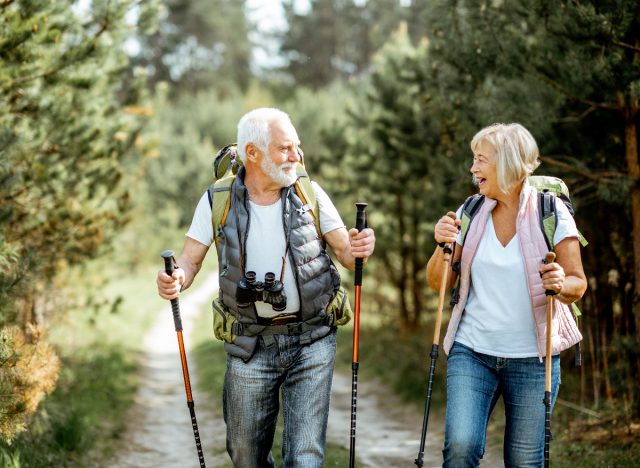
Some people are natural night owls and probably prefer a late-night exercise routine. Even if you fall into that category and struggle to get out of bed before noon most days, there’s a big reason why you should at least consider getting in some exercise sessions under the sun’s rays: vitamin D!
When your skin is exposed to the sun, your body naturally produces essential vitamin D. Well, research published in the Journal of the Endocrine Society is now linking vitamin D deficiency with an increased risk of both heart attack and early death. Another study published in The American Journal of Cardiology concludes, “Vitamin D deficiency was associated with a significant risk of cardiovascular disease and reduced survival.”
By exercising outdoors while the sun is shining, you’ll gain all of the benefits linked to indoor workouts, all while ensuring your vitamin D levels stay healthy. “Morning sunlight is something I recommend to all of my clients. Sunlight early in the day can help regulate your circadian rhythm and improve the quality of your sleep. Even if you only have time for a 5-10 minute walk first thing in the morning, you can obtain the health benefits,” Dave Shelton, PT, Founder of My Fitness System tells Eat This, Not That!
Related: 4 Exercise Tricks That Fight Aging, Science Says
Don’t stress over exercise
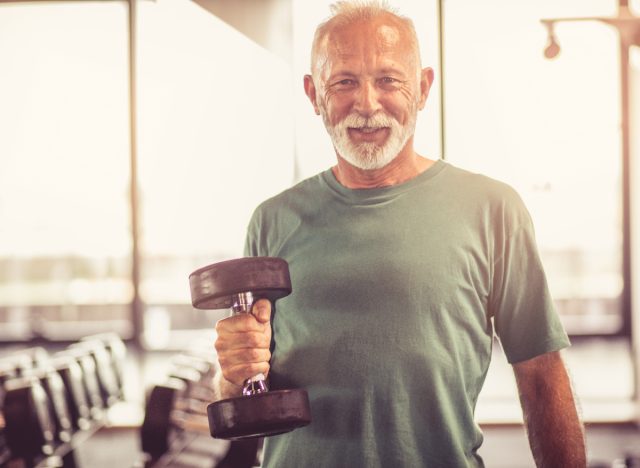
Exercise is a great way to relieve stress and tension, but it can also be a big life stressor if we allow fitness goals and comparisons to dominate our lives. This study published in Health Psychology even finds that worrying about not exercising as much as others is associated with an increased risk of premature death.
“Our findings fall in line with a growing body of research suggesting that our mindsets—in this case, beliefs about how much exercise we are getting relative to others—can play a crucial role in our health,” Alia Crum, assistant professor of psychology at Stanford University, explains in a university release.
Even if a study participant was getting plenty of exercise, if they believed they weren’t doing enough, their risk of passing away at an earlier age appeared to increase. More specifically, over a 21-year tracking period, those who saw themselves as less active than their peers were 71% more likely to pass away than others who considered themselves more active than their peers.
If you didn’t quite exercise as much as you planned on a particular day, that’s okay! Tomorrow always represents another chance at a fresh start. Conversely, if you’re exercising for hours on end every single day, it’s important to acknowledge the work you’re putting in. Exercise is, of course, a primarily physical endeavor. But, simply believing you’re doing right by your body is a big part of the equation as well.
“It’s time that we start taking the role of mindsets in health more seriously. In the pursuit of health and longevity, it is important to adopt not only healthy behaviors, but also healthy thoughts,” Crum concludes.

